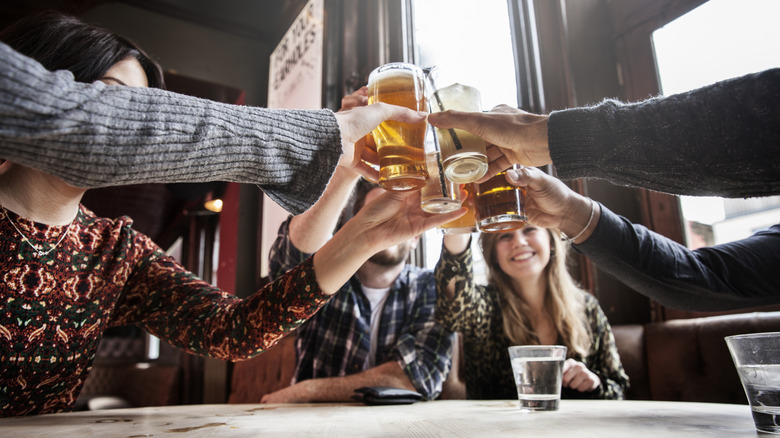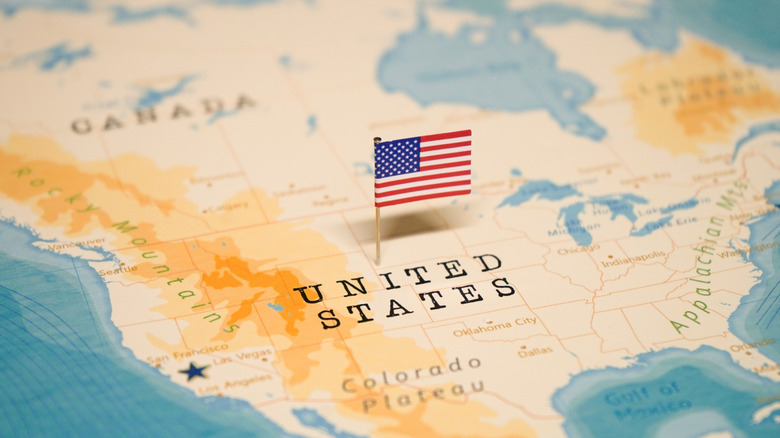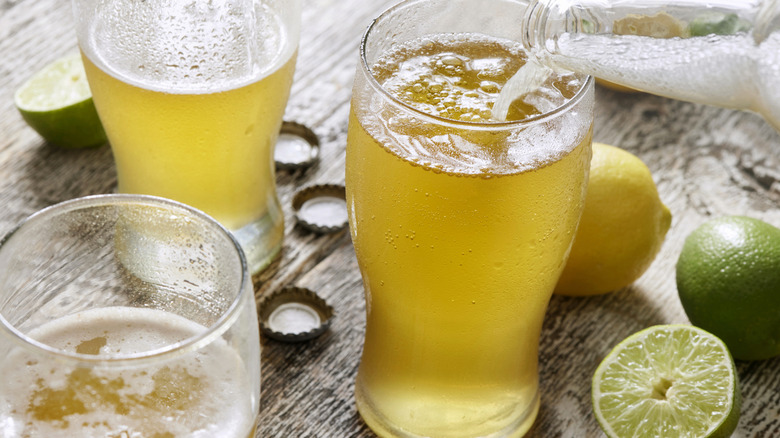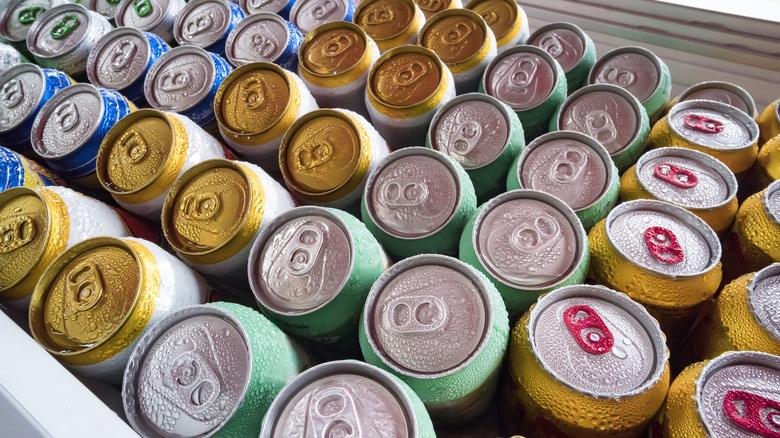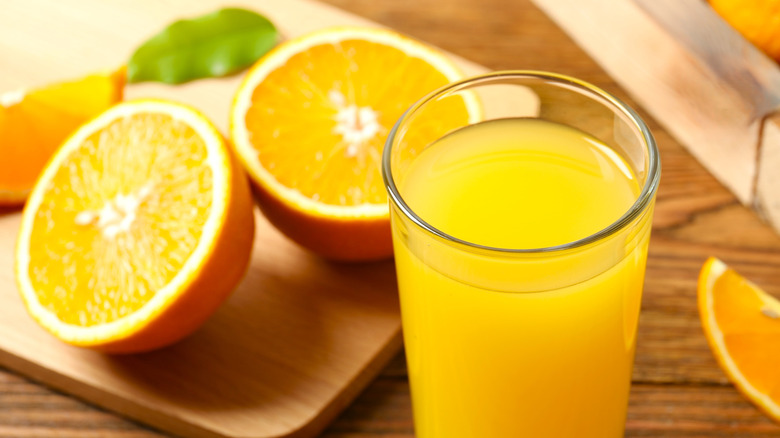Is It Legal To Drink Non-Alcoholic Beer When You're Under 21 In The US?
Non-alcoholic versions of drinks that were traditionally alcoholic have been gaining popularity in the United States. As they have become more widespread, it's now common for establishments to have at least one non-alcoholic beer on offer and the industry is consistently working to improve the drinking experience. However, the exponential expansion of the non-alcoholic beverage industry has created a slightly strange situation around the legality of purchasing and consuming these non-alcoholic drinks at certain ages.
Across the United States, it is illegal to purchase alcoholic drinks if you're under 21. Similarly, it is illegal to consume them if you're under 21, with some exceptions in various states around religious and medical exemptions, or laws that allow the consumption of alcohol either in a private area or under the supervision of a parent or guardian. While you might think that non-alcoholic beer would not be restricted by law and would just be treated as soft drinks, that's not the case.
US states where it's legal to drink non-alcoholic beer under age 21
Non-alcoholic beer in the United States is classified as beer with 0.5% ABV (alcohol by volume) or less. Despite the very small amount of alcohol present, alcohol laws in some states still apply, and other states have brought in laws related to non-alcoholic beers specifically. It is legal to drink non-alcoholic beer under the age of 21 only with parental permission and supervision in Louisiana, New Mexico, Oklahoma, Oregon, West Virginia, and Wyoming. In Ohio, non-alcoholic beer can be legally consumed if you're over 18, and in Mississippi and North Dakota, you can drink non-alcoholic beer between 18 and 21 only with parental supervision.
There are 15 states that have a full prohibition on the consumption of non-alcoholic beers under the age of 21. These are Alabama, Georgia, Idaho, Indiana, Kansas, Maine, Michigan, Missouri, Nebraska, New York, Pennsylvania, South Carolina, South Dakota, Tennessee, and Utah.
There are also nine states where there are no clear laws one way or another when it comes to the consumption of non-alcoholic beer. In those states, servers might err on the side of caution and refuse to provide non-alcoholic beer to a minor to avoid potential penalties. Those states are Arizona, Arkansas, Colorado, Connecticut, Delaware, Kentucky, Nevada, New Hampshire, and Vermont.
The remaining 17 states allow people of any age to consume non-alcoholic beer.
Why it is illegal for minors to drink non-alcoholic beer in some states
It makes sense that alcoholic beer is illegal for minors to purchase or consume in the United States. As well as the many risks that alcohol use poses in adults, younger people are already working from a point of worse judgment in most cases and there is evidence that alcohol can negatively impact brain development (per National Institute on Alcohol and Alcoholism). However, as all non-alcoholic beer has little to no alcohol in it, why is it still illegal for minors in so many states?
Some of these problems come down to the fact that existing laws that ban alcoholic beer for minors don't specify anything about the ABV of beer. The Federal Alcohol Administration Act (which is unrelated to actual drinking ages as that is decided by the states) defines beer as simply a malt beverage and similar language is used by some states. In other cases, it has more to do with caution of not wanting to go down that road and have kids having mental associations with beers, and even when there aren't laws, some shopkeepers choose not to sell non-alcoholic beer to children.
It's unclear if non-alcoholic beer is dangerous for minors
It would be nice to know exactly what the impacts of non-alcoholic beer on minors might be, but there are too many complexities that can't ethically be studied. If a child drinks non-alcoholic beer every day, are they more likely to develop a drinking problem later in life when alcoholic beer becomes readily available to them? We don't have the data on that.
However, when it comes to alcohol's effect on the body, it's a little easier to say with certainty that non-alcoholic beer would not have any significant effects on a minor. While a non-alcoholic beer can have as much as 0.5% alcohol, most have much less. Some beers list themselves as being fully 0% alcohol and it's most common to see 0.05% alcohol in non-alcoholic beers. That means that to get to the same alcohol content as a single beer, you'd be looking at drinking 100 non-alcoholic beers, which isn't a realistic thing to be concerned about.
Small amounts of alcohol can occur naturally in foods
To put into perspective just how little alcohol is in the average non-alcoholic beer, it is good to know how much alcohol naturally occurs in some other foods that we feed to minors. Bacteria and yeast can interact with the sugars in many foods to generate alcohol and provide a low alcohol content to foods without it being a concern.
A ripe banana can have a 0.2% ABV, with higher percentages the riper it gets. Fruit juices ferment a small amount with apple juice able to have an ABV of 0.08% while grape juice can have an ABV of 0.11%. Those are very low amounts of alcohol, but still more than the average can of non-alcoholic beer. Even the yeasting process that causes bread to rise produces small amounts of alcohol in the end result. Similarly, most vinegars have between 0.1 and 0.4% ABV, while soy sauce has as much as 2%. While there are potential social and psychological effects of minors drinking non-alcoholic beer and they likely shouldn't be drinking it in excess, the amount of alcohol that they could be exposed to really doesn't rise to a significant amount.
